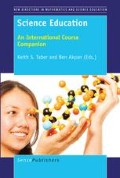Abstract
On a daily basis, science teachers are called upon to provide rich learning experiences to their students.
Access this chapter
Tax calculation will be finalised at checkout
Purchases are for personal use only
Preview
Unable to display preview. Download preview PDF.
References
Abd-El-Khalick, F., Boujaoude, S., Duschl, R., Lederman, N. G., Mamlok-Naaman, R., Hofstein, A., & Tuan, H. L. (2004). Inquiry in science education: International perspectives. Science Education, 88(3), 397–419.
Chin, C. (2006). Classroom interaction in science: Teacher questioning and feedback to students’ responses. International Journal of Science Education, 28(11), 1315–1346.
Davis, E., Petish, D., & Smithey, J. (2006). Challenges new science teachers face. Review of Educational Research, 76, 607–651.
Luft, J. A. (1997). Design your own rubric. Science Scope, 20(5), 25–27.
Luft, J. A., Firestone, J., Wong, S., Adams, K., Ortega, I., & Bang, E. J. (2011). Induction programs and beginning science teachers: Beliefs, knowledge and practices during the first two years. Journal of Research in Science Teaching, 48(10), 1199–1224.
NGSS Lead States. (2013). Next generation science standards: For states, by states. Washington, DC: The National Academies Press.
Penick, J. E., Crow, L. W., & Bonnstetter, R. J. (1996). Questions are the answers. The Science Teacher, 63(1), 26–29.
Posner, G. J., Strike, K. A., Hewson, P. W., & Gertzog, W. A. (1982). Accommodation of a scientific conception: Toward a theory of conceptual change. Science Education, 66(2), 211–227.
Roth, K. J., Garnier, H. E., Chen, C., Lemmens, M., Schwille, K., & Wickler, N. I. (2011). Videobased lesson analysis: Effective science PD for teacher and student learning. Journal of Research in Science Teaching, 48(2), 117–148.
Rowe, M. B. (1986). Wait time: Slowing down may be a way of speeding up! Journal of Teacher Education, 37(1), 43–50.
Slavin, R. E., Hurley, E. A., & Chamberlain, A. (2003). Cooperative learning and achievement: Theory and research. In W. Reynolds & G. Miller (Eds.), Handbook of psychology: Part 3 (pp. 177–198). New York, NY: Wiley.
Smith, C. L., Wiser, M., Anderson, C. W., & Krajcik, J. (2006). FOCUS ARTICLE: Implications of research on children’s learning for standards and assessment: A proposed learning progression for matter and the atomic-molecular theory. Measurement: Interdisciplinary Research & Perspective, 4(1–2), 1–98.
Wiliam, D., & Black, P. (1996). Meanings and consequences: A basis for distinguishing formative and summative functions of assessment? British Educational Research Journal, 22(5), 537–548.
Zembal-Saul, C., Blumenfeld, P., & Krajcik, J. (2000). Influence of guided cycles of planning, teaching, and reflection on prospective elementary teachers’ science content representations. Journal of Research in Science Teaching, 37(4), 318–339.
Editor information
Editors and Affiliations
Rights and permissions
Copyright information
© 2017 Sense Publishers
About this chapter
Cite this chapter
Luft, J.A., Dubois, S.L. (2017). Essential Instructional Practices for Science Teaching. In: Taber, K.S., Akpan, B. (eds) Science Education. New Directions in Mathematics and Science Education. SensePublishers, Rotterdam. https://doi.org/10.1007/978-94-6300-749-8_18
Download citation
DOI: https://doi.org/10.1007/978-94-6300-749-8_18
Publisher Name: SensePublishers, Rotterdam
Online ISBN: 978-94-6300-749-8
eBook Packages: EducationEducation (R0)

